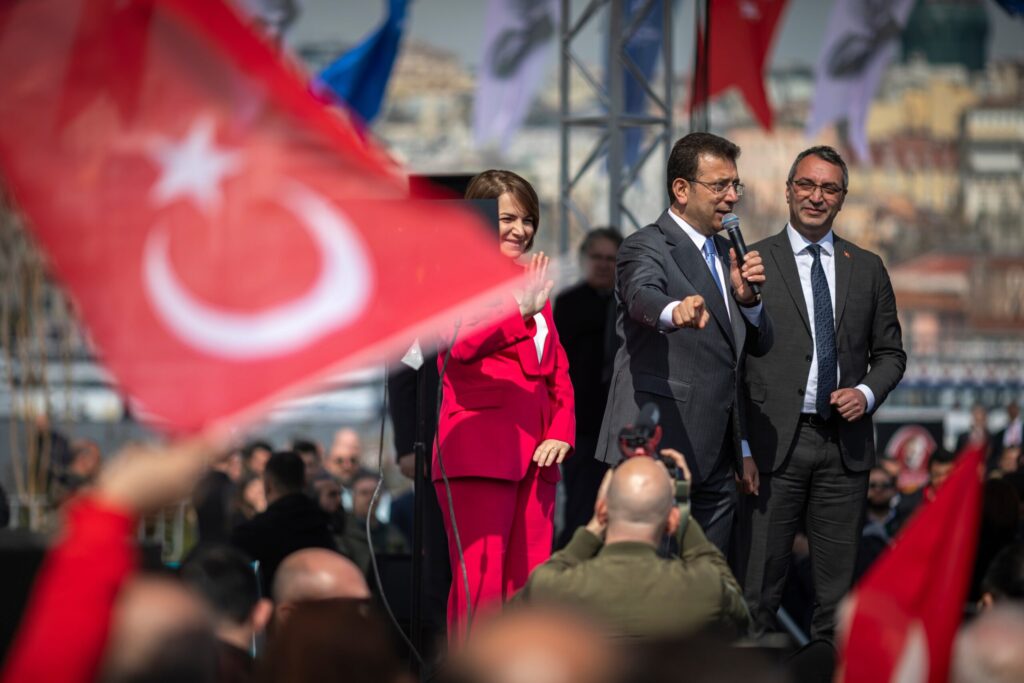In 1977, Israel witnessed the so-called “Mahapach” (Hebrew for upheaval or revolution) when the right-liberal Likud party put an end to 28 years of left-center government. Similar dramatic changes are underway in Turkey, reverberating from the corridors of power in Ankara to the streets of Istanbul and beyond. Turkey’s 2024 local elections will be a watershed moment for the country’s conservative and nationalist factions, signaling a seismic shift in the political landscape that could have significant implications for the country’s future.
Turkey’s local elections on March 31, 2024 looked different from past elections. The People’s Alliance, the ruling coalition between the Justice and Development Party (AKP) and the Nationalist Movement Party (MHP), suffered a major setback by losing control of several key municipalities. This marked a departure from the enthusiasm that characterized the May 2023 general elections, and the ramifications of this election outcome will have a profound effect on the role of political actors in Turkish society.
The Republican People’s Party’s (CHP) victory as the largest party, relegating the AKP to second place, was seen as a major blow to Turkey’s conservative and right-wing factions. Various factions within these groups have speculated about the reasons for the defeat, but a prevailing theory suggests that the country’s economic downturn prompted voters to send a harsh message to the ruling class. This view resonates in the context of right-wing politics in Turkey, where the relationship between conservative social groups and their political representatives is not based on mutual exchange.
Deep-rooted trust in strong leadership, combined with an unshakeable belief in the absolute legitimacy of the leader, fosters an organic bond between leaders and political parties, making internal reforms difficult. Moreover, the mystical worship of the state that Turkish conservatives harbor suppresses public dissent. In this sense, the local elections have provided an unprecedented opportunity for Turkish conservatives to dramatically express their political discontent, pushing the ruling party into the opposition’s seats at the local level.
Moreover, the 2024 local elections represent a setback for the Turkish right as a whole, with the exception of Fatih Erbakan’s New Welfare Party (YRP), which seems to buck this trend by continuing the political legacy and rhetoric of his father Necmettin Erbakan. The YRP platform, focused on anti-vaccination, nationalist Islamist themes, and many other idiosyncratic policy proposals, unexpectedly attracted as much as 7% of the vote. Disillusioned AKP supporters took refuge in the YRP, buoyed by the belief that such changes would not undermine the AKP’s standing. However, post-election analysis shows that the People’s Alliance vote share is hovering around 49%, with the anti-Erdogan coalition slightly ahead with 50.2%. Despite the shrinking of mainstream right-wing parties, this does not necessarily mean a paradigm shift for right-wing voters.
The AKP’s fall to second place has sparked a fierce debate among the Turkish right. While some blame this decline on a weak economy and poor candidate selection, a broader analysis suggests that macro factors are at work. The AKP’s origins can be traced back to the social division between the periphery and the center, driven by the capitalist transformation of Turkey’s economy and the centralization of the state bureaucracy. As a political voice for the marginalized, the AKP initially gained traction. Over time, however, the party’s shift towards a conservative and nationalistic rhetoric alienated pragmatic and liberal elements, ultimately creating a new “other.”
The “iron law of oligarchy” and the identity crisis within conservatism, which has led to grassroots rejection of decisions made by elected party elites, highlight a complex environment. Long-term conservative rule combined with increasingly close ties to state institutions has created a new political orthodoxy that rejects opponents as security threats. Furthermore, a conservative ideology leaning towards a geopolitical revisionist position and unable to adapt to changing circumstances has emerged as a prominent challenge.
A central dilemma in pursuing a conservative agenda in Turkey revolves around the political and geopolitical implications of Islam. The AKP’s challenge in crafting a comprehensive conservative doctrine is further complicated by transnational religious affiliations, particularly the concept of the ummah. This global Islamic solidarity can sometimes impede the full realization of national identity, as demonstrated in the debate over Turkey-Israel trade relations. The AKP’s post-Arab Spring foreign policy rhetoric aimed at addressing the issue of the ummah under Turkish control has been recalibrated since 2020, but its social repercussions remain.
Subscribe now to get a daily email in your inbox
Going forward, the 2024 elections will have far-reaching effects on Turkey, especially in terms of building ties with world powers such as the United States ahead of the 2028 elections. Turkey’s economic dependence on foreign funding underscores the need for stronger partnerships with the EU and the United States. A collaboration between President Erdogan and Trump’s United States could foster cooperation at the regional and global levels while sharing mutual understanding. This could result in Erdogan’s influence in the domestic political sphere being strengthened.
However, a glaring flaw in Turkish conservatism is its lack of engagement with conservatives across its borders, which has led to stagnation in its domestic policies. Cultivating ties with American conservatism could be a crucial step in revitalizing Turkey’s conservative movement.
While the results of Turkey’s local elections represent a major setback for the conservative nationalist camp, it is important not to overlook the roughly 49% of the vote that the right wing received. This represents the most important political capital for the right as it prepares for the 2028 elections, and shows that although the conservative base is faltering, it remains a powerful force in Turkish politics.


